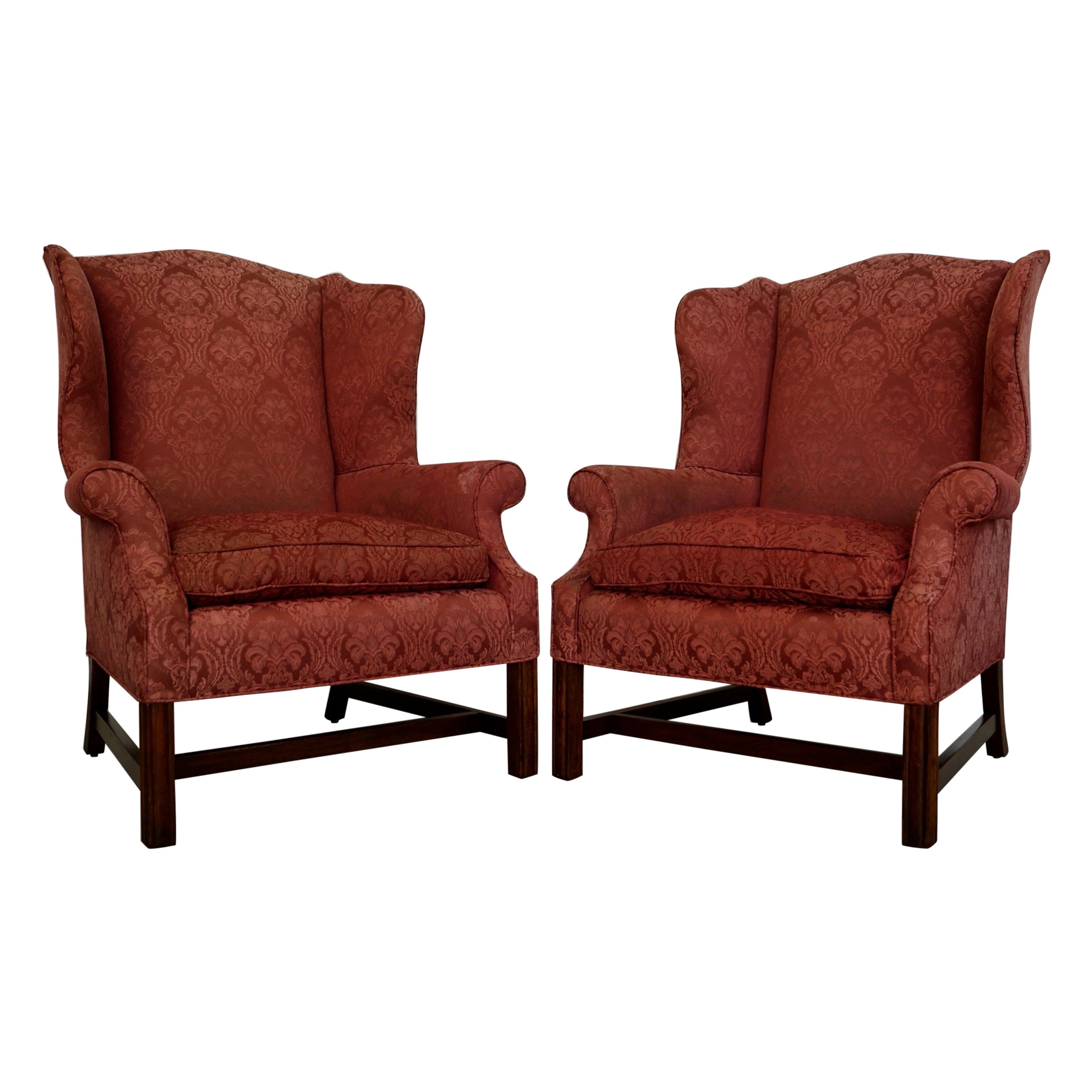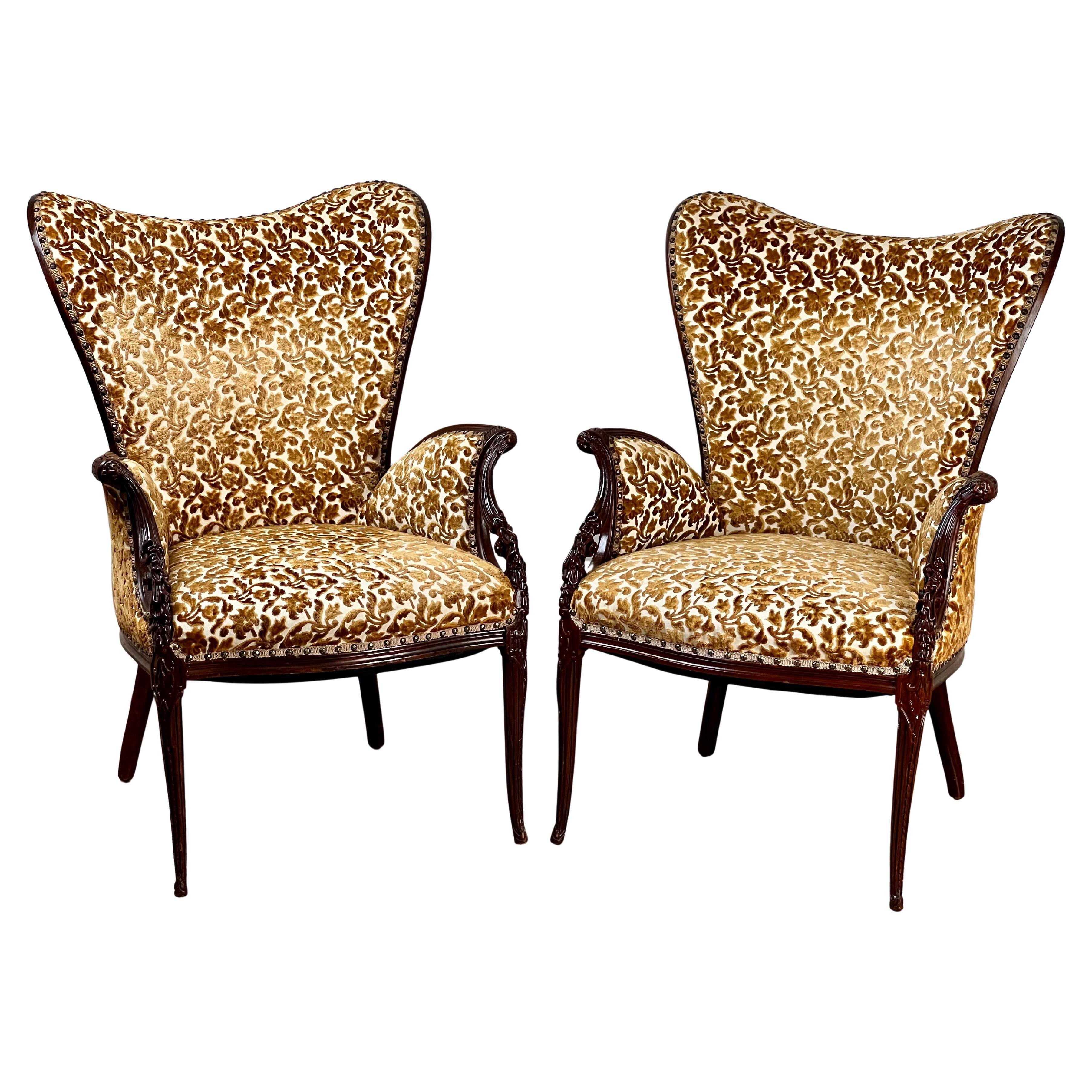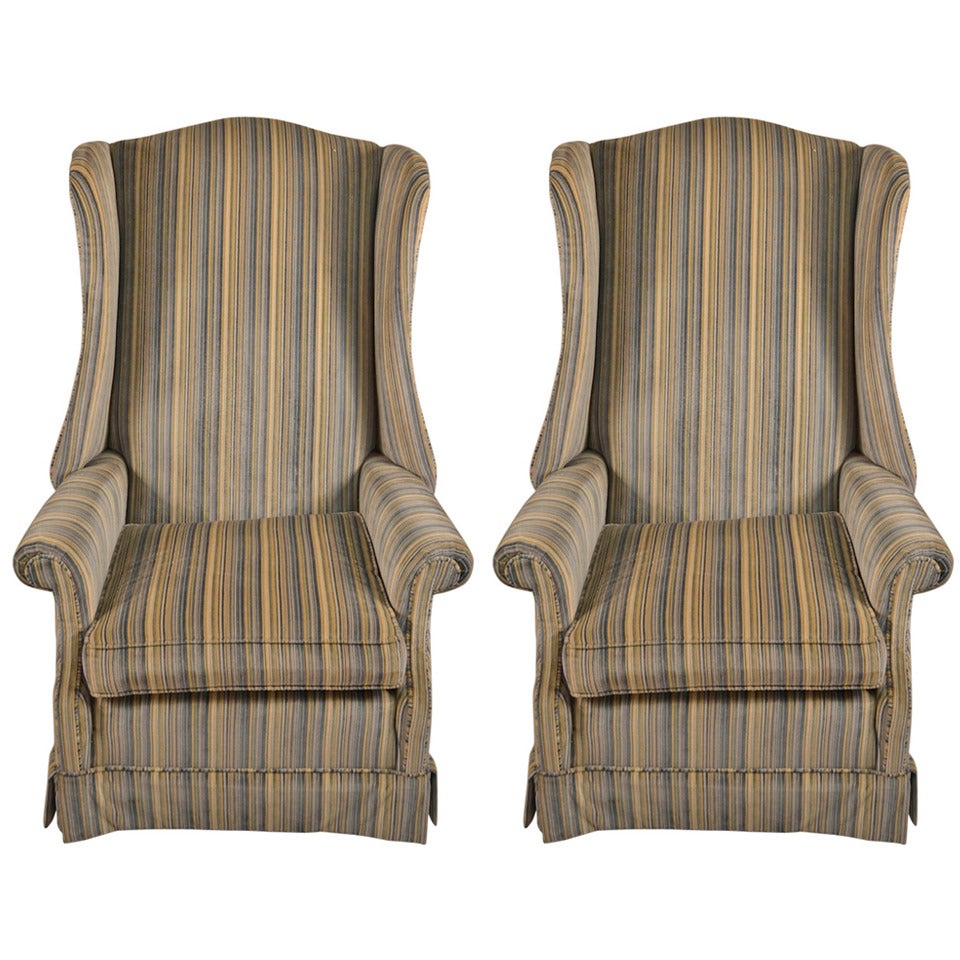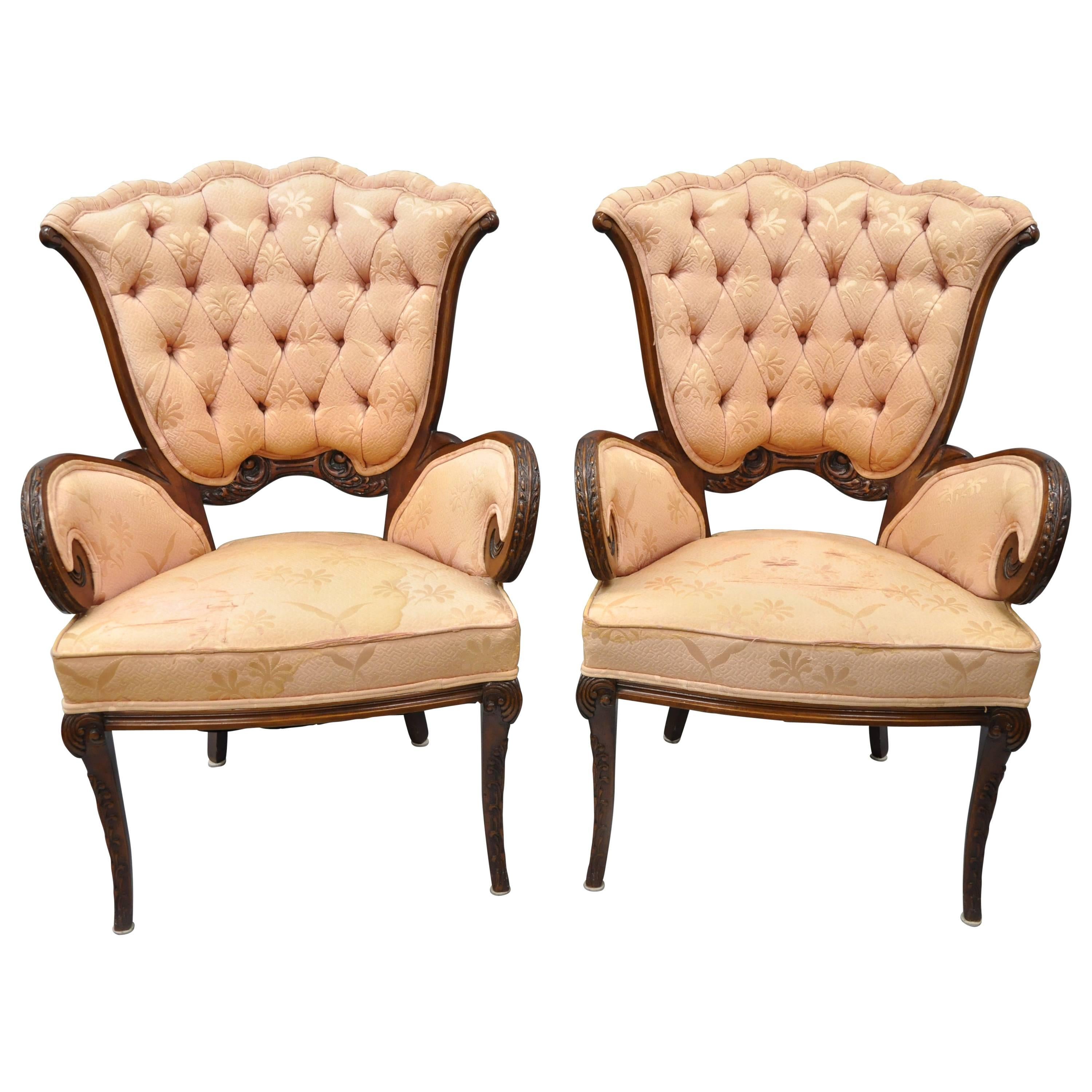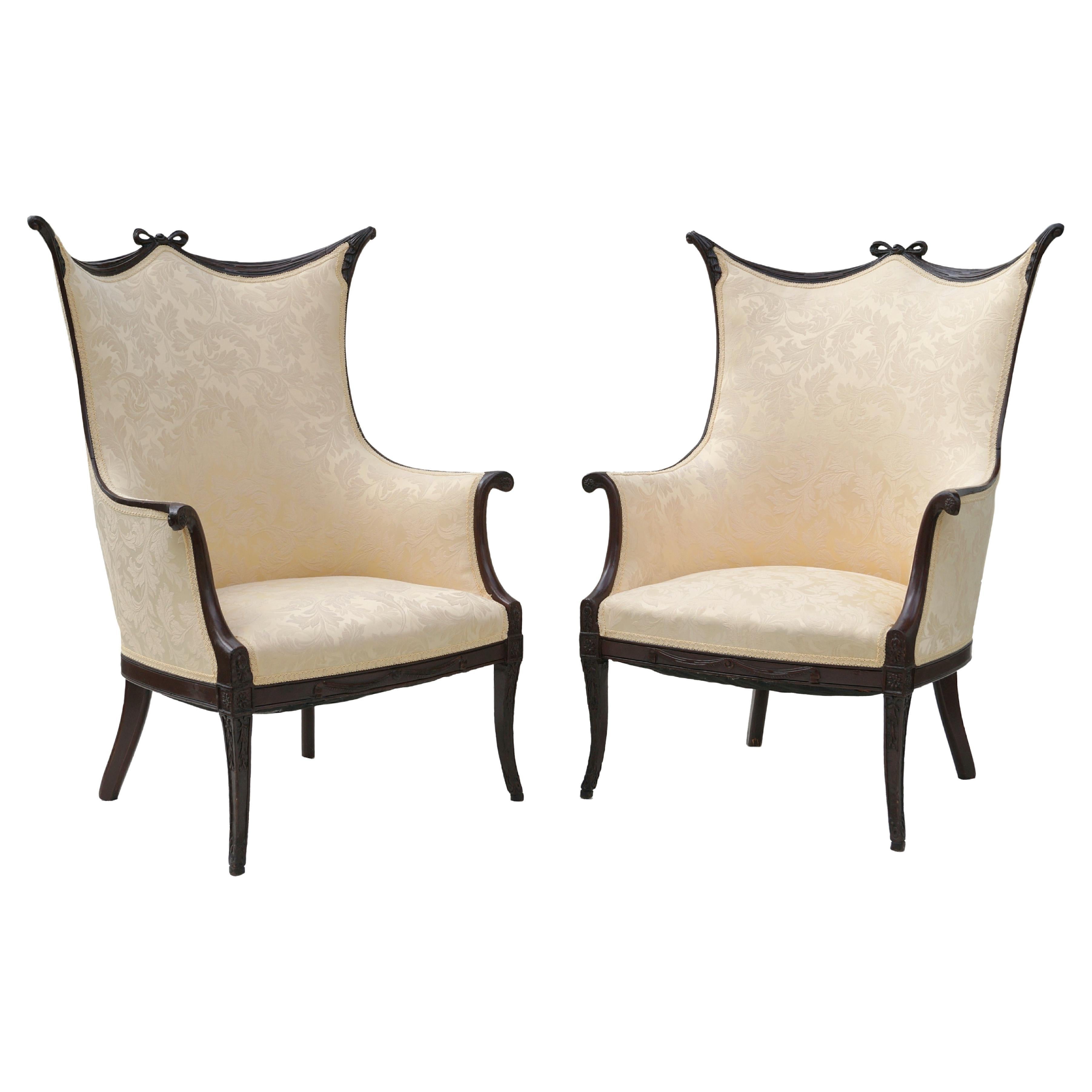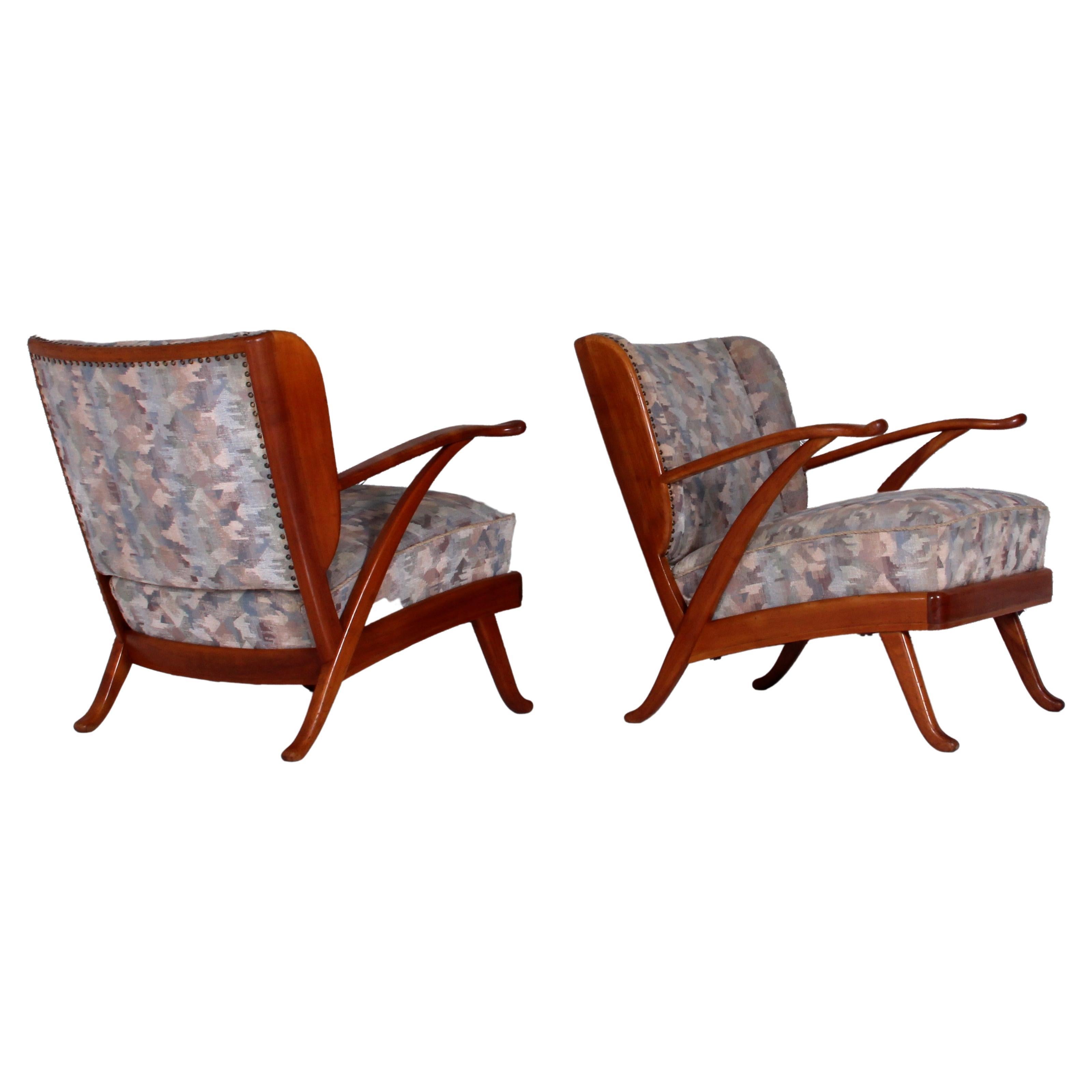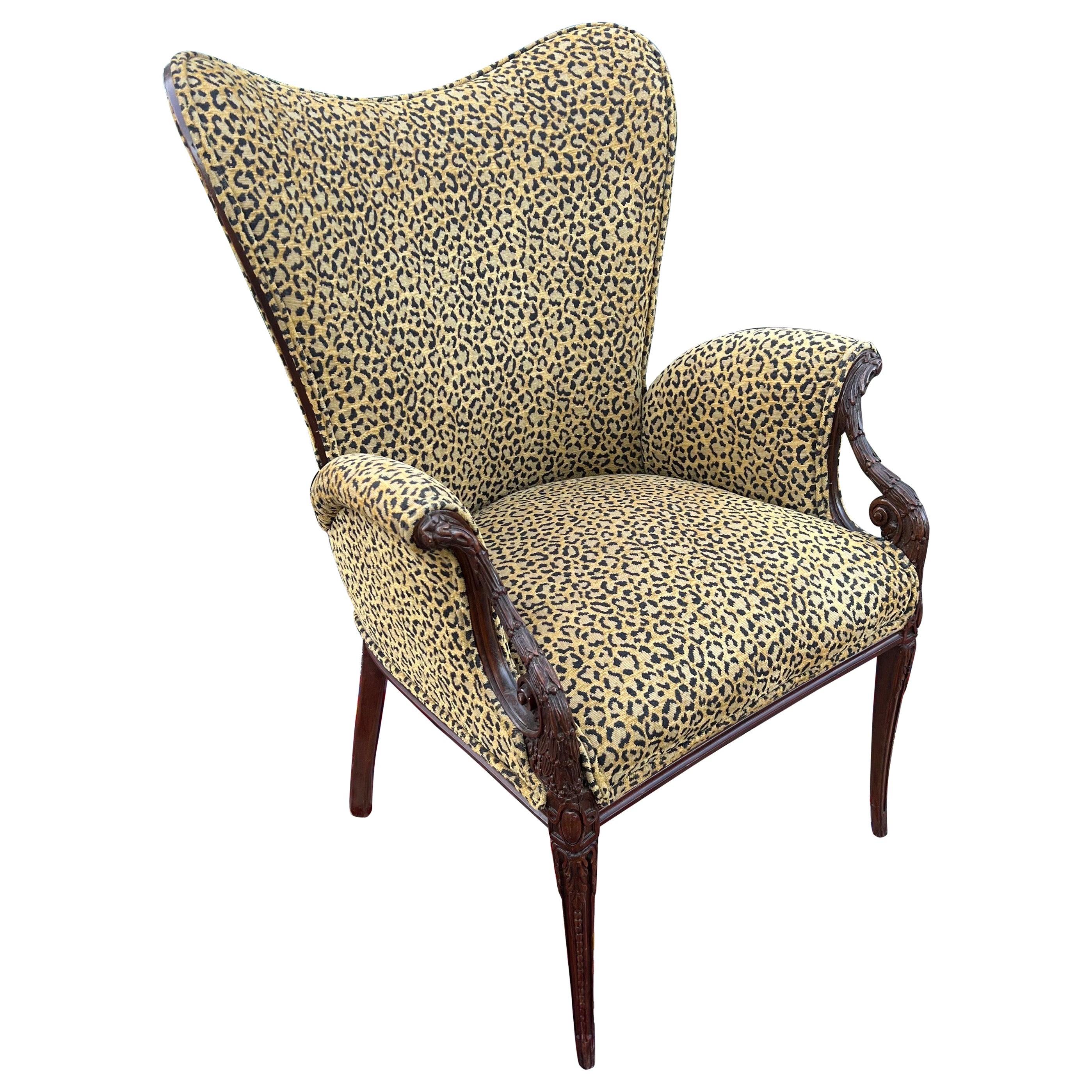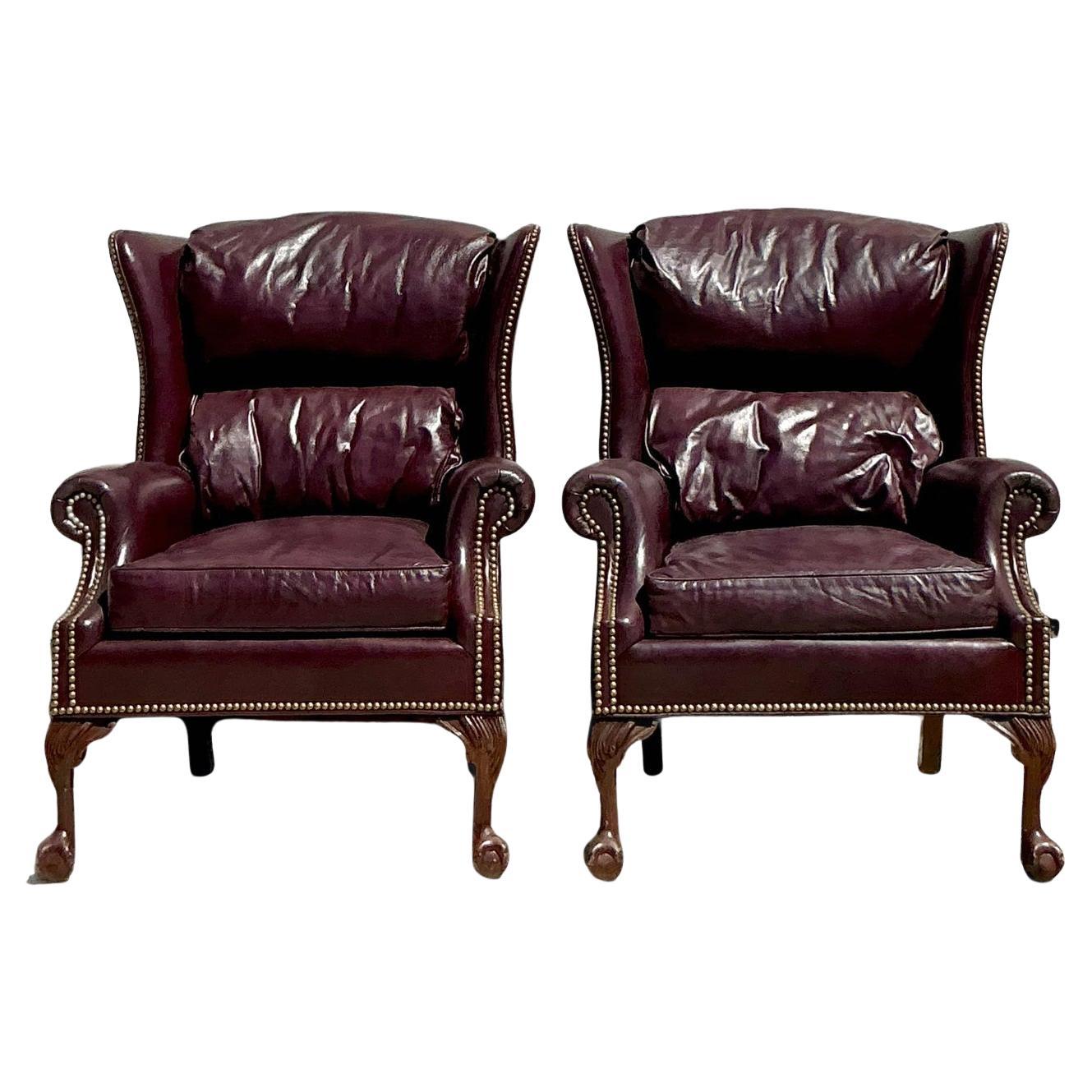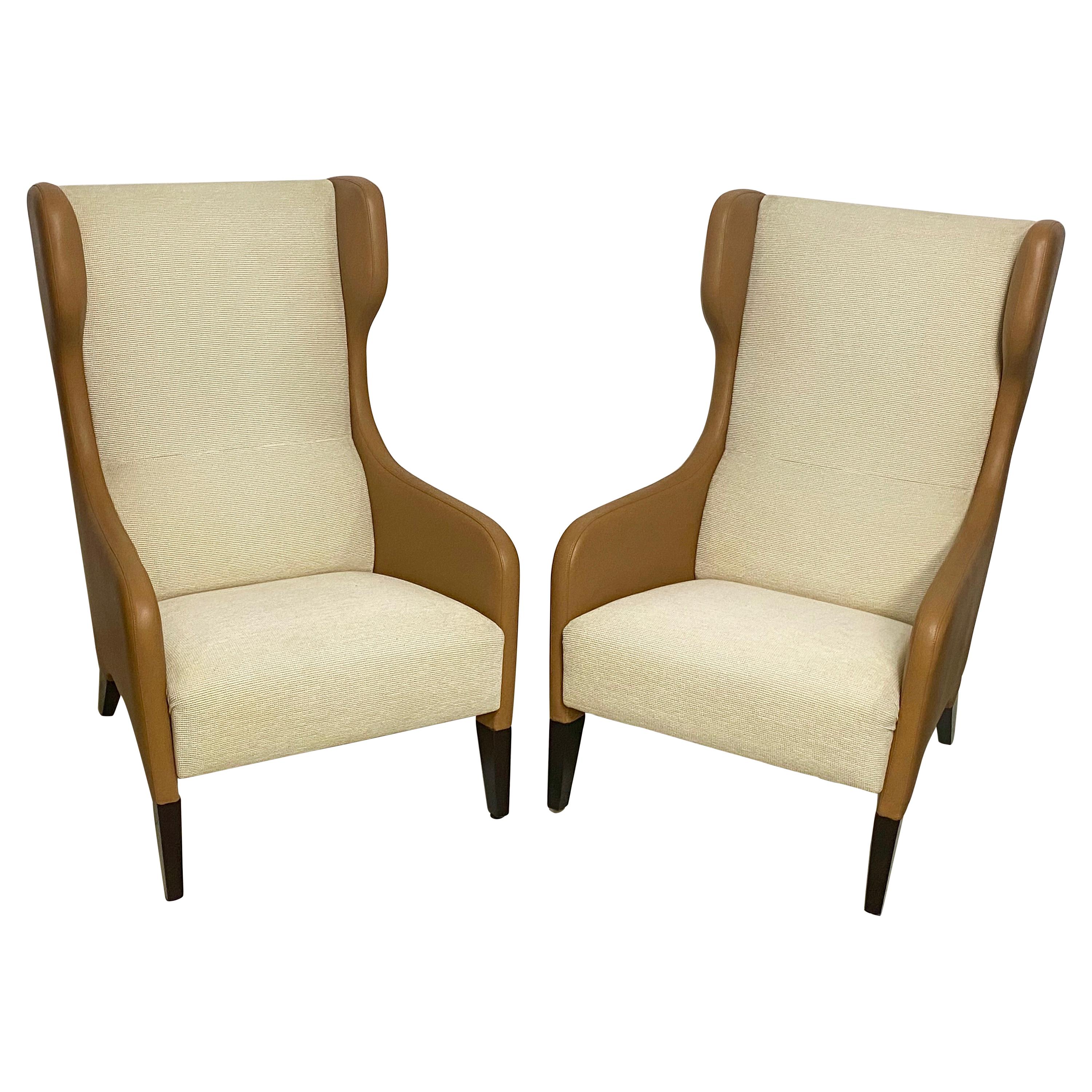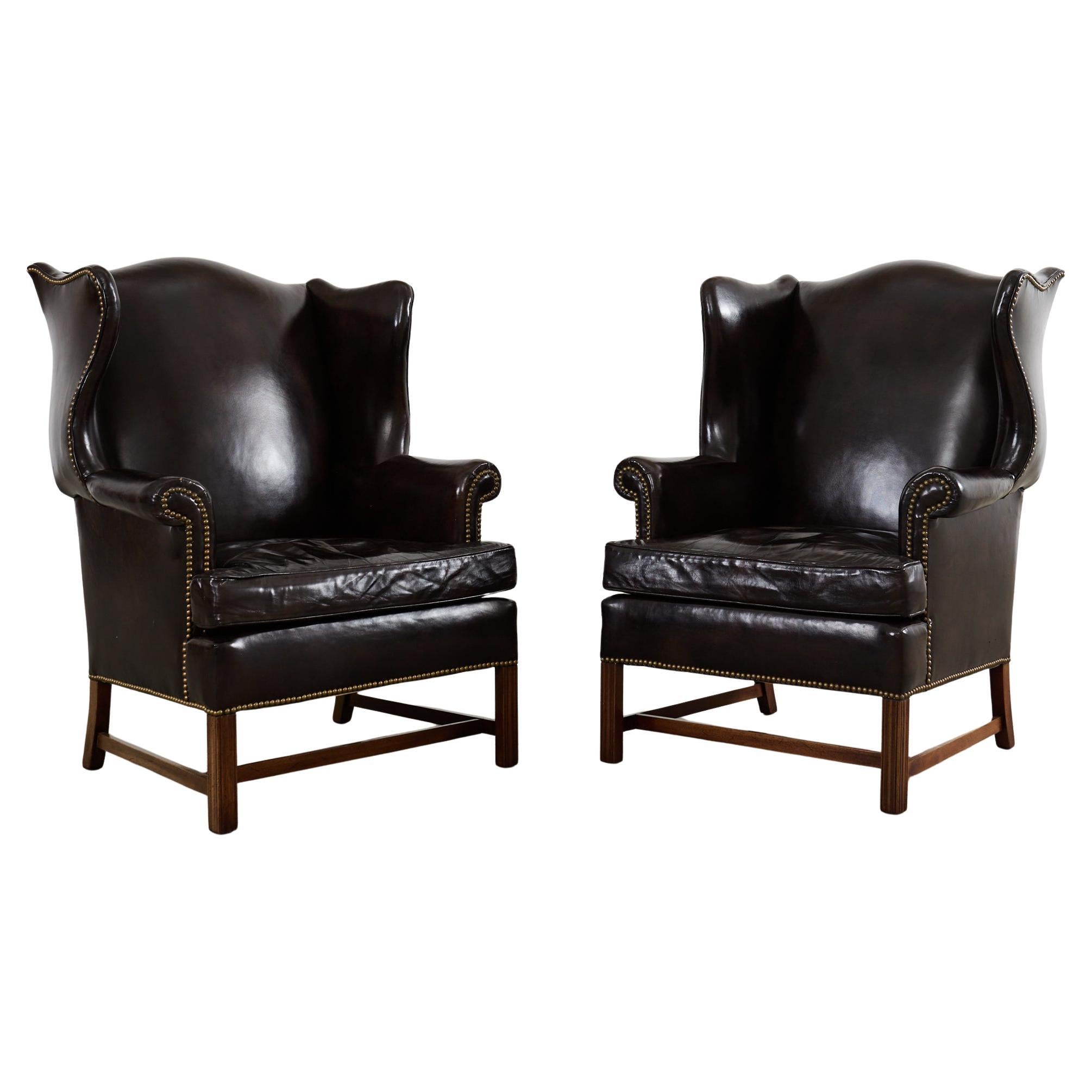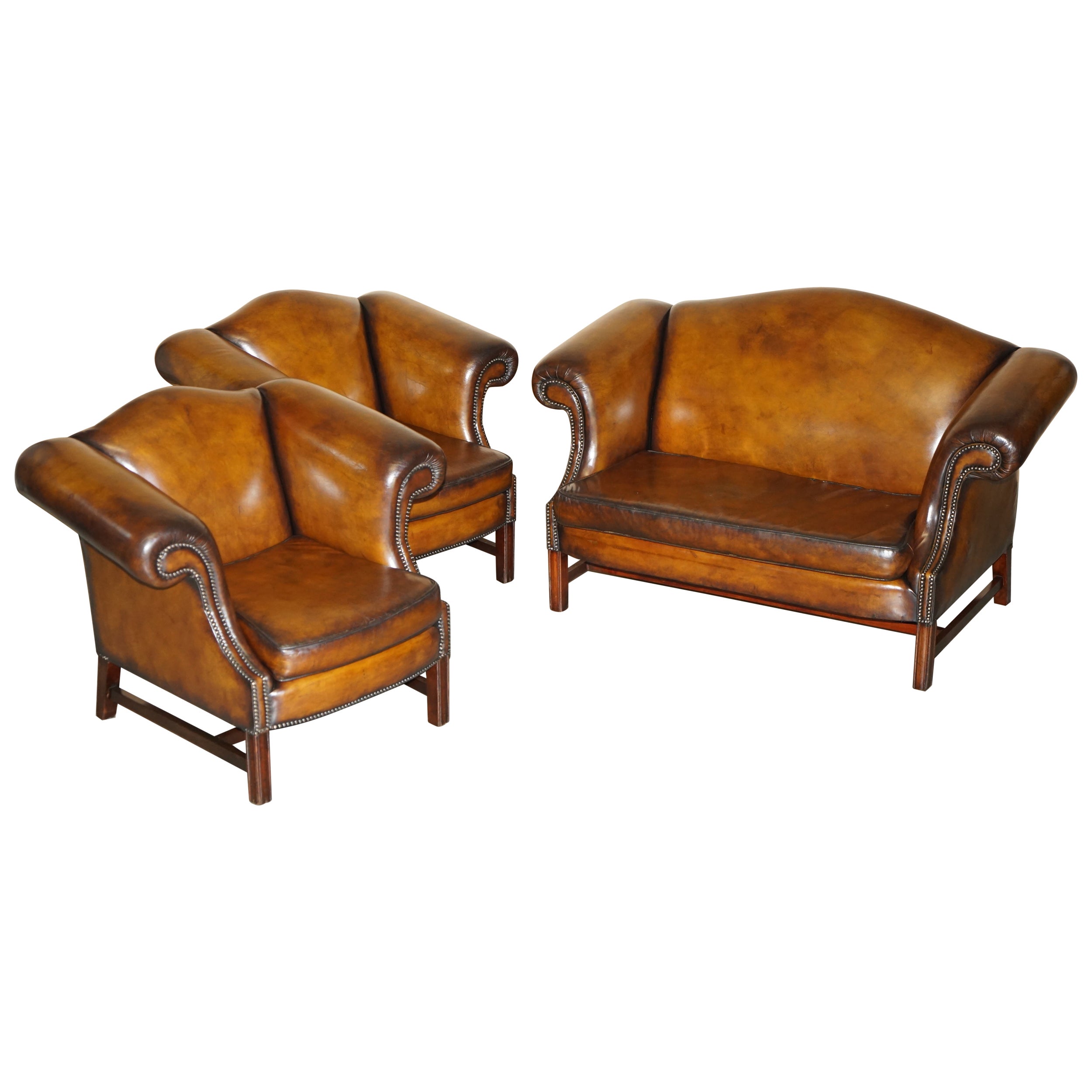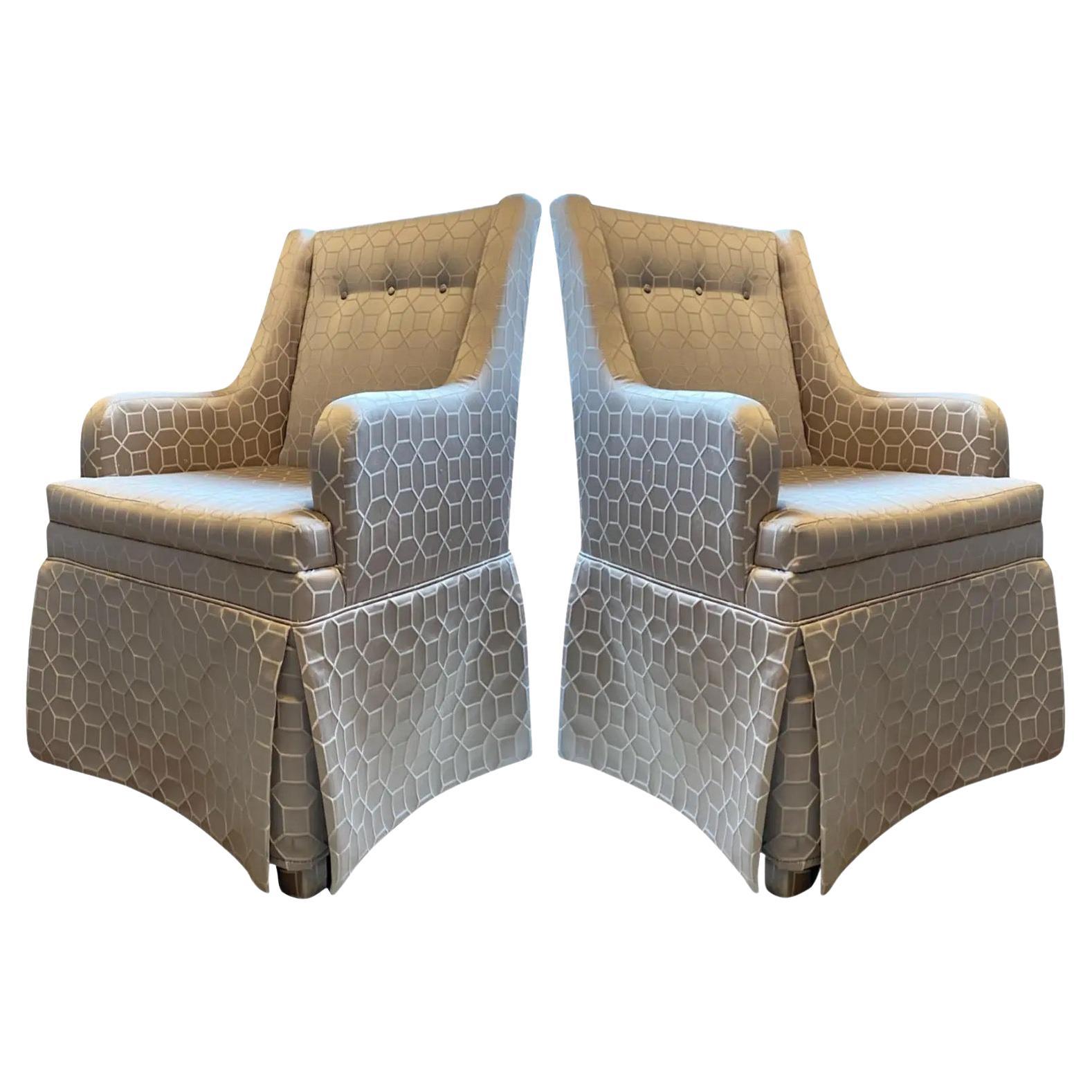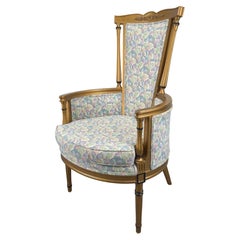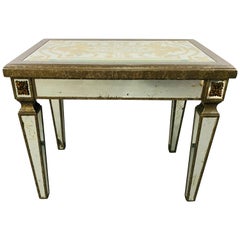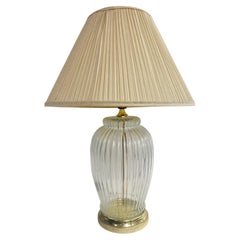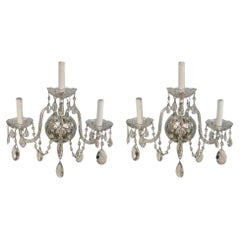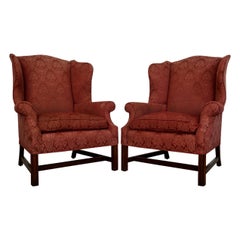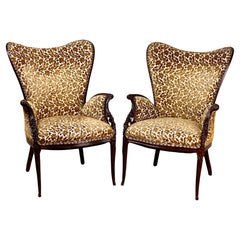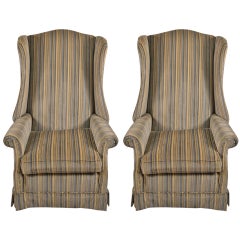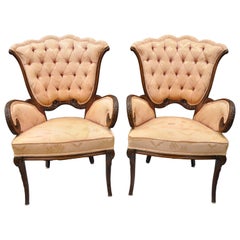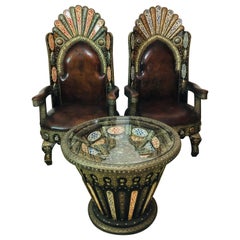
Hollywood Regency Royal Style Handmade Fine Leather Pair of Chairs and Table
View Similar Items
Video Loading
Want more images or videos?
Request additional images or videos from the seller
1 of 22
Hollywood Regency Royal Style Handmade Fine Leather Pair of Chairs and Table
About the Item
- Dimensions:Height: 62 in (157.48 cm)Width: 33 in (83.82 cm)Depth: 26 in (66.04 cm)Seat Height: 20 in (50.8 cm)
- Sold As:Set of 3
- Style:Hollywood Regency (In the Style Of)
- Materials and Techniques:
- Place of Origin:
- Period:
- Date of Manufacture:1970s
- Condition:Wear consistent with age and use.
- Seller Location:Plainview, NY
- Reference Number:Seller: AS-2451stDibs: LU5060216397732
About the Seller
5.0
Platinum Seller
Premium sellers with a 4.7+ rating and 24-hour response times
Established in 2014
1stDibs seller since 2019
319 sales on 1stDibs
Authenticity Guarantee
In the unlikely event there’s an issue with an item’s authenticity, contact us within 1 year for a full refund. DetailsMoney-Back Guarantee
If your item is not as described, is damaged in transit, or does not arrive, contact us within 7 days for a full refund. Details24-Hour Cancellation
You have a 24-hour grace period in which to reconsider your purchase, with no questions asked.Vetted Professional Sellers
Our world-class sellers must adhere to strict standards for service and quality, maintaining the integrity of our listings.Price-Match Guarantee
If you find that a seller listed the same item for a lower price elsewhere, we’ll match it.Trusted Global Delivery
Our best-in-class carrier network provides specialized shipping options worldwide, including custom delivery.More From This Seller
View All19th Century French Louis XVI Style Wingback Chair
Located in Plainview, NY
A 19th-century French Louis XVI style Wingback chair crafted in the classic neoclassical elegance. The chair features a high, winged backrest that gently curves, providing both aesth...
Category
Antique Late 19th Century Louis XVI Wingback Chairs
Materials
Upholstery, Wood
$840 Sale Price
40% Off
Hollywood Regency Style Églomisé Mirrored Side Table
Located in Plainview, NY
A Hollywood Regency style églomisé mirrored side table. The table top features a fine gold yellow paint design with a wooden antiqued frame. The ...
Category
Vintage 1970s Hollywood Regency End Tables
Materials
Mirror, Wood
$750 Sale Price
48% Off
Midcentury Hollywood Regency Style Glass Table Lamp
Located in Plainview, NY
An elegant Hollywood Regency style table lamp featuring a pleated glass oval body. A brass rod attaching the socket to the round solid brass base. The mid-century table lamp is class...
Category
20th Century Hollywood Regency Table Lamps
Materials
Brass
$150 Sale Price
72% Off
French Hollywood Regency Style Crystal Wall Sconce, a Pair
Located in Plainview, NY
A remarkable pair of French Hollywood Regency style crystal wall sconces. These exquisite sconces are a tribute to timeless elegance and style.
Crafted with meticulous attention to...
Category
20th Century Hollywood Regency Wall Lights and Sconces
Materials
Crystal
$825 Sale Price
50% Off
Hollywood Regency Chinese Style Bronze Filigree Design Tiered Table Lamp, a Pair
Located in Plainview, NY
A striking pair of Hollywood Regency Chinese-style table lamps, exuding opulence and grace. Crafted with meticulous artistry, these tiered lamps stand as majestic pieces, fashioned f...
Category
Early 20th Century Hollywood Regency Table Lamps
Materials
Bronze
$3,040 Sale Price
20% Off
Hollywood Regency Style Magazine Rack
Located in Plainview, NY
An elegant and beautiful black metal magazine rack with brass frame and handle. The rack is finely decorated with hand painted designs on each side. The brass is elegantly carved wit...
Category
Vintage 1980s American Hollywood Regency Magazine Racks and Stands
Materials
Metal, Brass
$850 Sale Price
41% Off
You May Also Like
1960's Hollywood Regency Federal Style Wingback Chairs - a Pair
By Baker Furniture Company
Located in Burbank, CA
Pair of vintage wing chairs for sale. From the 1960's, and very high-quality chairs. The seats have coil springs, and the seat cushions are down filled. Incredibly solid construction...
Category
Vintage 1960s American Federal Wingback Chairs
Materials
Fabric, Walnut
Vintage Pair Grosfeld House Hollywood Regency Fireside Chairs c. 1940
By Grosfeld House
Located in Westfield, MA
These Vintage Grosfeld House Hollywood Regency Fireside Chairs, dating to around 1940, are stunning examples of mid-20th-century American luxury furniture. The striking silhouette fe...
Category
Vintage 1940s American Hollywood Regency Wingback Chairs
Materials
Velvet, Mahogany
Pr Hollywood Regency High Back Wing Chairs
Located in New York, NY
Fun stripped upholstery, high back wing.lounge chairs. Clean and ready to use.
Category
Vintage 1960s American Hollywood Regency Wingback Chairs
Materials
Velvet
$1,800 / set
Pair of Mahogany Hollywood Regency Tufted Armchairs Attributed to Grosfeld House
By Grosfeld House
Located in Philadelphia, PA
Pair of antique mahogany Hollywood Regency tufted armchairs attributed to Grosfeld House in the Dorothy Draper style. Chairs feature solid carved mahogany wood frames, scrolling arms...
Category
Mid-20th Century American Hollywood Regency Armchairs
Materials
Mahogany
Pair Early French Carved Sculptural Lounge Chairs Neoclassical Hollywood Regency
Located in Wayne, NJ
Gorgeous pair of vintage sculpted line French style armchairs with carved details. The fabric appears to have been re upholstered, at some point, so is in very good condition. A few ...
Category
Early 20th Century Unknown Neoclassical Wingback Chairs
Materials
Wood
$2,800 Sale Price / set
20% Off
Midcentury set of 2 solid cherry wood wingback armchairs & sofa Karl Nothhelfer
Located in Landshut, BY
just beautiful
SET of Sofa & 2 Wingback Armchairs
by Prof. Karl Nothelfer - Designed in 1957
maker: Schörle & Gölz in Stuttgart - Bad Cannstatt
solid Cherry Wood
new upholstery and fabrics in 1998 according to last owner ( since then just in use for 2 years so upholstery is perfect ! )
Seatrests can be removed - and fixed by clips on belts
- high class -
measurements:
easy chair is 70cm wide ~ sofa is 178cm wide
both: seating height 40cm ~ seating depth: 57cm
condition - all firm and in very good condition - no damages
furniture have fully been accurately cleaned ::
- 3 steps: A: air pistol - B: industrial hoover - C: latest Kärcher "wash&hoover" technology
- woods have been polished several times
note: please ask for shipping quote by sending us your postcode/destination
Prof. Karl Nothelfer
* 14 June 1900 ~~ + 20 May 1980
Since the beginning of the 15th century, the Nothelfer family of carpenters has been continuously resident in the former
town of Überlingen without interruption. Every carpenter at that time mastered
all the possibilities of woodworking: so did the Nothelfer. They could carpenter,
even carve altars and figures, and set them in gold, silver and paint.
(churches in Owingen and Hödingen]. Some family members lived and worked
and worked in Hedingen or Hödingen,like today the jubilarian Karl Nothelfer (this in 1975).
His father, Karl Anton Nothelfer, as the eldest of seven siblings, was able to take over his father's carpentry business in Überlingen.
Karl Anton Nothelfer, the eldest of seven siblings, was unable to take over his father's carpentry business in Überlingen.
He instead moved to the industrial town of Singen with his young wife Rosalie, née Hanner, from the
from Hohenzollern in 1896 and moved to the former Poststraße and founded his own carpenter's workshop.
He had a highsense of quality and form and was already a member of the German Werkbund before 1914.
Karl Nothelfer and his three siblings grew up in such air.
After attending school and the secondary school in Singen, the young Karl learned the carpenter's trade in his father's workshop then moved on to the Badische Landes-Kunstschule in Karlsruhe,
where he studied architecture. At that time the well-known furniture professor also worked there
Fritz Spannagel, born in Freiburg in 1891, who settled in 1938 at Ittendorf Castle near Meers-
burg (died 1957). In 1928, the gifted young architect received a teaching assignment at the
at the Karlsruhe School of Art, but followed his teacher Spannagel to Berlin in the same year.
Berlin. Here he worked from 1928-1945 as a teacher - appointed professor in 1931 - at the
Berlin Tischler-Schule, the later Bauschule für Raumgestaltung.
The furniture he created in Berlin became internationally known through many exhibitions and lectures.
nationally known and influential. His furniture creations ushered in a new era in German and
a new era in German and European furniture design. At the world exhibition in Paris
1937 Prof. Nothelfer was awarded the Golden Medal for his work in the furniture sector.
for his work in the furniture sector. A first summary and balance of his work on furniture is given in his standard work
1942 published standard work "Das Sitzmöbel", the first compendium of its kind in the world.
world. In 1950 he published his second work "Furniture". Both books and a
series of brochures were published by Verlag Otto Maier, Ravensburg.
Karl Nothelfer continued to work intensively on the design of seating furniture in the years after 1945.
In 1950 he succeeded in the important invention of the two-legged skid-base chair, which has been
orthopedically - anatomically tested thousands of times - has become accepted all over the world today.
Even the most distinguished American furniture companies such as Miller or Knoll-International
use the skid as the main theme for desks and chairs. At the same time, N. had a groundbreaking
in the redesign of German school furniture and seating for industry.
industry. He succeeded in adapting his furniture forms, which originated in wood and handicraft, to the modern technical
modern technical possibilities of the industry. He thus became the great refor-
of schoolroom furnishings. The architect Nothelfer thinks about himself,
that he made his main contribution in the field of seating furniture, although this was not
was not really his profession.
After the war, Prof. Nothelfer, like so many others, had to start all over again. He settled
settled in his home town of Lake Constance in Hödingen in 1945 as a freelance architect and was
and was involved in all areas of construction in the years after the war. As early as 1935, he had given many
the example of American prefabricated buildings and recommended serial house
and recommended it at a time when no one in Germany was even thinking about mass production. Now he developed
he developed several types of mass-produced houses, which were manufactured in Baiersbronn.
of which more than 800 houses were built in France alone (types Paris, Provence, Normandie).
were built. At that time [1946], as part of the reparations in Strasbourg, there was an exhibition of houses with Swedish, Danish, and French designs.
with Swedish, Danish, Finnish, English and German houses, where the French occupation
for which 6 different types were sent from the French occupation zone, the
Nothelfer's house type was considered the top of this exhibition.
Karl Nothelfer was also involved in the development of chipboard. In 1946, together with others in Munich, he founded the first
magazine "Bauen und Wohnen" ("Building and Living") after the war and remained its co-editor for many years.
co-editor of this magazine for many years. By presenting his own work, he has here
interpreted what the essence of the magazine wanted to be: Building, in order to live in it, in order to live as a human being and humanly in the built. Karl Nothelfer planned his houses
furniture ground plan, from the need for living. In 1948 he was appointed honorary senator of the State Building
school in Holzminden.
Karl Nothelfer did not build much in Singen. The first post-war house was Haus
Fahr on the slope of the Hohentwiel (Domäne); the building material came from a demolished
log house that a French officer had built for himself on the Schie- nerberg.
nerberg. In 1952, he also built the administration building of the aluminum rolling mill in Singen.
rolling mills in Singen, with relief and wall painting by C. G. Becker. In Überlingen he built
In Überlingen he built, among others, the Buchinger Sanatorium, the Riese+ Hähnel radio house and
various reconstructions in the old town: Haus Kitt with the Glockenspiel, the Haus mit dem
Bacchus in the Überlingen village, the Dolphin Fountain in Hödingen (1975). Probably the most beautiful
Haus Nothelfers, the Haus Himmelheber, stands in Baiersbronn-Tonbach. On the airfield
Mengen, Nothhelfer built the casino building with the 30 square meter faience painting Ikarus by
C. G. Becker. In 1954 he founded a second office with architect Hans Schwingen in Düsseldorf.
Office, which primarily fertilized the housing construction, true to the motto:from the inside to
planning from the outside. The Minister of Housing awarded a prize to the best social housing in North Rhine-
Westphalia; it was from the Nothelfer+Schwingen studio in Düsseldorf. Also the idea of
new idea of home ownership was also promoted by Nothelfer+Schwingen.
promoted by Nothelfer+Schwingen. On the occasion of the red jubilee of the law about condominium ownership
Nothelfer gave a lecture in Essen in 1961 on condominium ownership in Europe (published as a brochure).
published as a brochure]. From Düsseldorf, among many others, in the silk city...
Category
Vintage 1950s German Mid-Century Modern Living Room Sets
Materials
Fabric, Cherry, Upholstery
Recently Viewed
View AllMore Ways To Browse
4 Strand R Arm Rattan Chair
Depression Modern Brand Art Deco Sofa
Inga Sempe Moel
Mahogany Setee
Placide Of Wood
1970 Bamboo And Rope Coffee Table
Arnolfo Simon
Art Deco Bamboo Stylized Lounge Chairs
Bob Dubois
De Sede D125
Ercol Lounge Set
Fred Lowen Tessa Black
French Giltwood Sofa And 2 Armchairs
Girsberger On Sale
Henry Link Wicker Couch
Moss 1800 Sofa By Artu
Ritts Tropicana
Small Croissant Sofa
